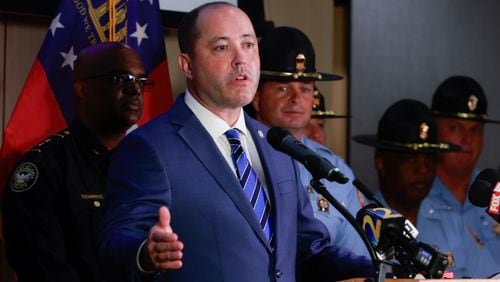Moments after Gov. Brian Kemp delivered his State of the State address this week, dozens of General Assembly Democrats held a press conference to detail all of the ways the governor’s plans will fall short of serving all Georgians.
Leading the charge was state Sen. Gloria Butler, the petite, white-haired, Senate Democratic leader. Wearing red glasses, pearls and a tailored yellow jacket, Butler called for a $15 state minimum wage, a repeal of the state’s new 6-week abortion ban, and a $10,000 pay raise for Georgia teachers.
“We can do all of these things to better the lives of Georgians,” she said.
Watch Butler operate in the Capitol and the question may occur to you — how did the 81-year-old great-grandmother of seven rise to the top position among Senate Democrats, a growing caucus full of ambitious up-and-comers?
State Sen. Sheik Raman, a Gwinnett Democrat, gave a clue in 2021 when he gave a floor speech to honor Butler as the first Black woman to serve as a leader in the Georgia Senate. “She has the quiet grace that belies her not-give-up attitude,” he said.
That “not-give-up attitude” is also the reason Butler is starting her 25th year in the chamber and why she insists Democrats are on the way to majority status in Georgia. Not giving up is also why she continues to run for reelection, why she took her first job in politics in her 50s, and even how she completed her business degree in her 20s with two young children.
“I went to school for two solid years without a break, and worked full time … but I got that degree,” she said.
Butler went on to work in accounting at Emory’s Health Sciences Center. She wanted to get involved in her community, so she volunteered for Cynthia McKinney’s 1992 congressional campaign. McKinney put Butler in charge of her successful get-out-the-vote operation.
After three years with McKinney on Capitol Hill, Butler moved back to Atlanta. In 1998, she ran for the state Senate from Stone Mountain and won.
Although Democrats were in charge when Butler joined the chamber, Republicans quickly won the majority and, eventually, the supermajority. At the same time, Butler rose through the Democratic leadership ranks as a voice for progressive policies.
When she speaks on the Senate floor, she does it with the historical background of having grown up in the segregated South, as so many older Black Georgians did, and of her time as a teenager in Daytona Beach, Fla. in the days when abortion was illegal in the country.
Butler said she looks at the direction of politics in Georgia today and worries that the progress of the last 50 years is vanishing.
“Sometimes I feel like we’re going backwards instead of going forward,” she said. “We should be moving away from what used to be, not toward it.”
She was elected minority leader by her colleagues in 2020 and reelected leader in 2022. She also chalks her own rise up to perseverance.
“I don’t shirk from duties,” she said. “I don’t shirk away from work, because that’s what I’ve been known to do, work.”
No leader is universally loved, and a handful of Senate Democrats grouse about some of the changes Butler has made.
“A few people might not be as happy with me as they could be,” Butler said. “But they have to know that my interest is in them and what they want to do.”
State Sen. Elena Parent, an Atlanta Democrat who chairs the Senate Democratic Caucus, said Butler has boosted staffing and organization for the caucus and made other necessary changes.
“Some of the things in the way we were doing business internally and externally, when we were seen as a permanent minority, needed to change,” she said. “Those changes have been happening since Gloria became leader.”
State Sen. Sonya Halpern, an Atlanta Democrat, said Butler’s age and experience are an asset, not a liability.
“Because she has been around for 24, going on 25 years, she has that historical reference,” Halpern said. “And I think that allows her to be able to keep the big picture in mind and not get mired down in some of the small stuff. It’s easy to be distracted.”
Along with the traditional leadership duties of messaging and fundraising, one of Butler’s most important jobs is to keep Democrats motivated after years as the minority party, both in the General Assembly and around Georgia.
“You’ve got to work every day as if you’re winning, even when you know you’re not winning,” she said. “You’ve got to still keep working towards that goal. Don’t lose your focus. Don’t lose your hope.”
The goal, she said, is returning Democrats to the majority, and, when they get there, having a caucus that knows what it wants to do with that power.
She compares their incremental progress to tapping on the side of a crystal glass.
“It’s not going to break right away,” she said, slowly tapping a finger on her desk. Tap. Tap. Tap. “But one day, you hit it just in the right place and that crystal is going to break.”
Then pick up the pieces and make something really special, she said.
“You keep banging at it. Keep working at it,” she tells her caucus. “And eventually it happens.”
About the Author







